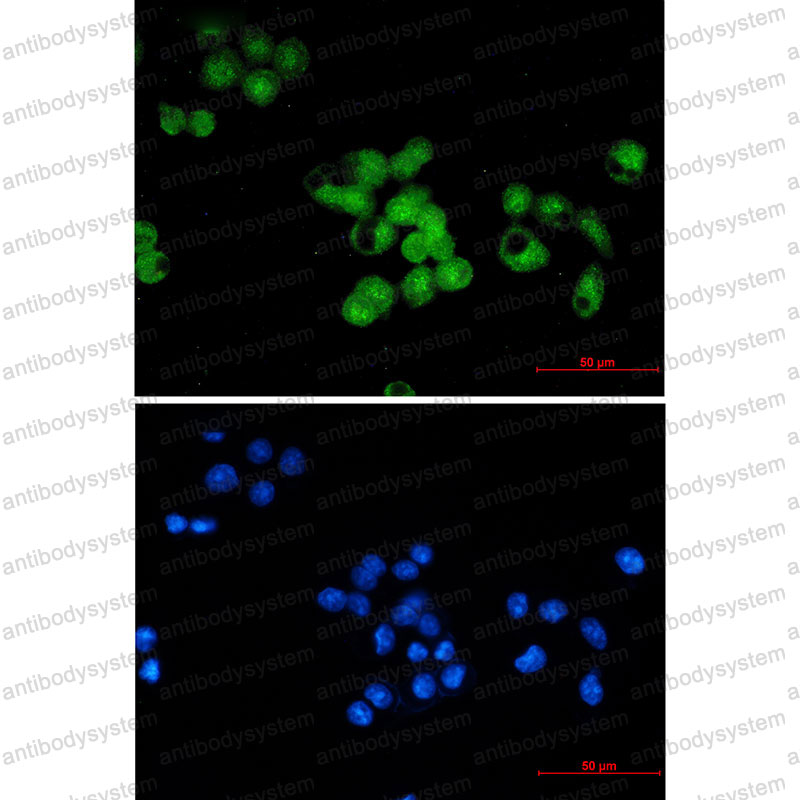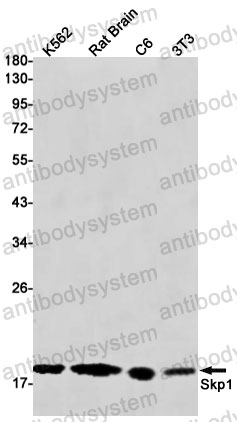Catalog No.
RHF59701
Species reactivity
Human, Mouse, Rat
Host species
Rabbit
Isotype
IgG
Clonality
Monoclonal
Tested applications
IF: 1:50-1:200, WB: 1:500-1:1000
Target
p19A, Organ of Corti protein 2, EMC19, SKP1, Organ of Corti protein II, OCP2, OCP-2, RNA polymerase II elongation factor-like protein, Cyclin-A/CDK2-associated protein p19, OCP-II, p19skp1, TCEB1L, S-phase kinase-associated protein 1, SIII, Transcription elongation factor B polypeptide 1-like, SKP1A
Concentration
1 mg/ml
Endotoxin level
Please contact with the lab for this information.
Purity
>95% by SDS-PAGE.
Purification
Protein A/G purified from cell culture supernatant.
Accession
P63208
Applications
IF, WB
Form
Liquid
Storage buffer
0.01M PBS, pH 7.4, 0.05% BSA, 50% Glycerol, 0.05% Sodium azide.
Stability and Storage
Use a manual defrost freezer and avoid repeated freeze thaw cycles. Store at 4 ℃ for frequent use. Store at -20 ℃ for twelve months from the date of receipt.
Clone ID
R2A68
Flavokawain B targets protein neddylation for enhancing the anti-prostate cancer effect of Bortezomib via Skp2 degradation., PMID:30885218
Skp1 in lung cancer: clinical significance and therapeutic efficacy of its small molecule inhibitors., PMID:26474281
Chemical Synthesis of a Glycopeptide Derived from Skp1 for Probing Protein Specific Glycosylation., PMID:26179871
SOX9 inhibits β-TrCP-mediated protein degradation to promote nuclear GLI1 expression and cancer stem cell properties., PMID:25632159
N-glycosylation of cholera toxin B subunit in Nicotiana benthamiana: impacts on host stress response, production yield and vaccine potential., PMID:25614217
Multiple Orientia tsutsugamushi ankyrin repeat proteins interact with SCF1 ubiquitin ligase complex and eukaryotic elongation factor 1 α., PMID:25166298
Identification of novel CDK9 and Cyclin T1-associated protein complexes (CCAPs) whose siRNA depletion enhances HIV-1 Tat function., PMID:23110726
The ORF2 glycoprotein of hepatitis E virus inhibits cellular NF-κB activity by blocking ubiquitination mediated proteasomal degradation of IκBα in human hepatoma cells., PMID:22590978
Radiosensitization of human pancreatic cancer cells by MLN4924, an investigational NEDD8-activating enzyme inhibitor., PMID:22072567
Fbxw7β resides in the endoplasmic reticulum membrane and protects cells from oxidative stress., PMID:21205095
ROC1/RBX1 E3 ubiquitin ligase silencing suppresses tumor cell growth via sequential induction of G2-M arrest, apoptosis, and senescence., PMID:19509229
Expression of calcyclin-binding protein/Siah-1 interacting protein in normal and malignant human tissues: an immunohistochemical survey., PMID:18443365
FBXO25-associated nuclear domains: a novel subnuclear structure., PMID:18287534
Diversity in tissue expression, substrate binding, and SCF complex formation for a lectin family of ubiquitin ligases., PMID:18203720
Spatial regulation of an E3 ubiquitin ligase directs selective synapse elimination., PMID:17626846
Positive and negative regulation of Tetrahymena telomerase holoenzyme., PMID:17220281
The Arabidopsis SKP1 homolog ASK1 controls meiotic chromosome remodeling and release of chromatin from the nuclear membrane and nucleolus., PMID:16940350
Stable barley chromosomes without centromeric repeats., PMID:15998740
Molecular analysis of holocentric centromeres of Luzula species., PMID:15753569
Regulation of lung cancer cell growth and invasiveness by beta-TRCP., PMID:15536641
Mimicking phosphorylation of the small heat-shock protein alphaB-crystallin recruits the F-box protein FBX4 to nuclear SC35 speckles., PMID:15511225
Phosphorylation and specific ubiquitin acceptor sites are required for ubiquitination and degradation of the IFNAR1 subunit of type I interferon receptor., PMID:15337770
Identification of a novel splice variant: human SGT1B (SUGT1B)., PMID:15018354
Ubiquitination-mediated regulation of biosynthesis of the adhesion receptor SHPS-1 in response to endoplasmic reticulum stress., PMID:14701835
Calcium-regulated interaction of Sgt1 with S100A6 (calcyclin) and other S100 proteins., PMID:12746458
Fragmin60 encodes an actin-binding protein with a C2 domain and controls actin Thr-203 phosphorylation in Physarum plasmodia and sclerotia., PMID:12167630
OCP2 immunoreactivity in the human fetal cochlea at weeks 11, 17, 20, and 28, and the human adult cochlea., PMID:12117534
Fission yeast F-box protein Pof3 is required for genome integrity and telomere function., PMID:11809834
OCP1, an F-box protein, co-localizes with OCP2/SKP1 in the cochlear epithelial gap junction region., PMID:11470190
Analysis of Skp1 glycosylation and nuclear enrichment in Dictyostelium., PMID:11358877
The spike of S phase cyclin Cig2 expression at the G1-S border in fission yeast requires both APC and SCF ubiquitin ligases., PMID:11163211
Evolutionary conservation of kinetochore protein sequences in plants., PMID:11151678
The SCF ubiquitin ligase protein slimb regulates centrosome duplication in Drosophila., PMID:10996795
Components of an SCF ubiquitin ligase localize to the centrosome and regulate the centrosome duplication cycle., PMID:10485847
Association of human SCF(SKP2) subunit p19(SKP1) with interphase centrosomes and mitotic spindle poles., PMID:10066383
Association of human CUL-1 and ubiquitin-conjugating enzyme CDC34 with the F-box protein p45(SKP2): evidence for evolutionary conservation in the subunit composition of the CDC34-SCF pathway., PMID:9430629
cDNA cloning, tissue distribution, and chromosomal localization of Ocp2, a gene encoding a putative transcription-associated factor predominantly expressed in the auditory organs., PMID:7558018


